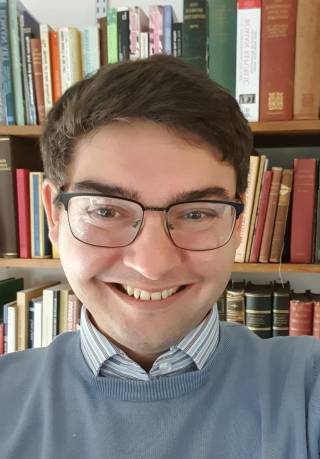Richard joined UCL in 2020 as a Research Fellow working on the ERC-funded project ‘Ordering, Constructing, Empowering: Fragments of the Roman Republican Antiquarians’ (FRRAnt). His work focuses on the scholarship of Republican and early Imperial Rome, its philosophical and ideological underpinnings, and its fate at the hands of subsequent ancient readers and early editors. He has allied interests in ancient historiography and pedagogy, the history of the book, and ancient mathematics. He is currently working on an edition of the mathematical texts transmitted with the corpus of Roman land-surveying treatises, with future plans to edit the fragmentary remains of Suetonius.
Before joining UCL, Richard also worked on the 'Fragments of the Republican Roman Orators' project at the University of Glasgow, and has lectured at Oxford, Glasgow, and the National University of Ireland, Galway.
Selected recent publications:
- R. M. A. Marshall, ‘Suetonius the Bibliographer’, in S. Adams (ed.), Scholastic Culture in the Hellenistic and Roman Eras: Greek, Latin, and Jewish (Berlin: De Gruyter, 2019): 119–46.
- R M. A. Marshall with C. Gray, A. Balbo, and C. Steel (eds), Reading Republican Oratory: Reconstructions, Contexts, Receptions (Oxford: Oxford University Press, 2018).
- R. M. A. Marshall, ‘Varro, Atticus, and Annales’, in V. Arena and F. Mac Góráin (eds), Varronian Moments. Bulletin of the Institute of Classical Studies 60.2 (London: Institute of Classical Studies, 2017): 61–75.
- R. M. A. Marshall, ‘“Bi-Marcus?” The two Varrones of Augustine and Nonius Marcellus’, Res publica litterarum 39 (2016): 180–203.
Other projects:
Richard ran the University of Glasgow’s postgraduate researcher development programme from 2017–2019.
He has also provided expertise on the material culture of early twentieth-century conflict for the Oxford Great War Archive and Europeana 1914-1918 Projects.
Research interests:
Varro, ancient scholarship, antiquarianism, historiography, mathematics, pedagogy, textual transmission, palaeography and codicology.
 Close
Close


